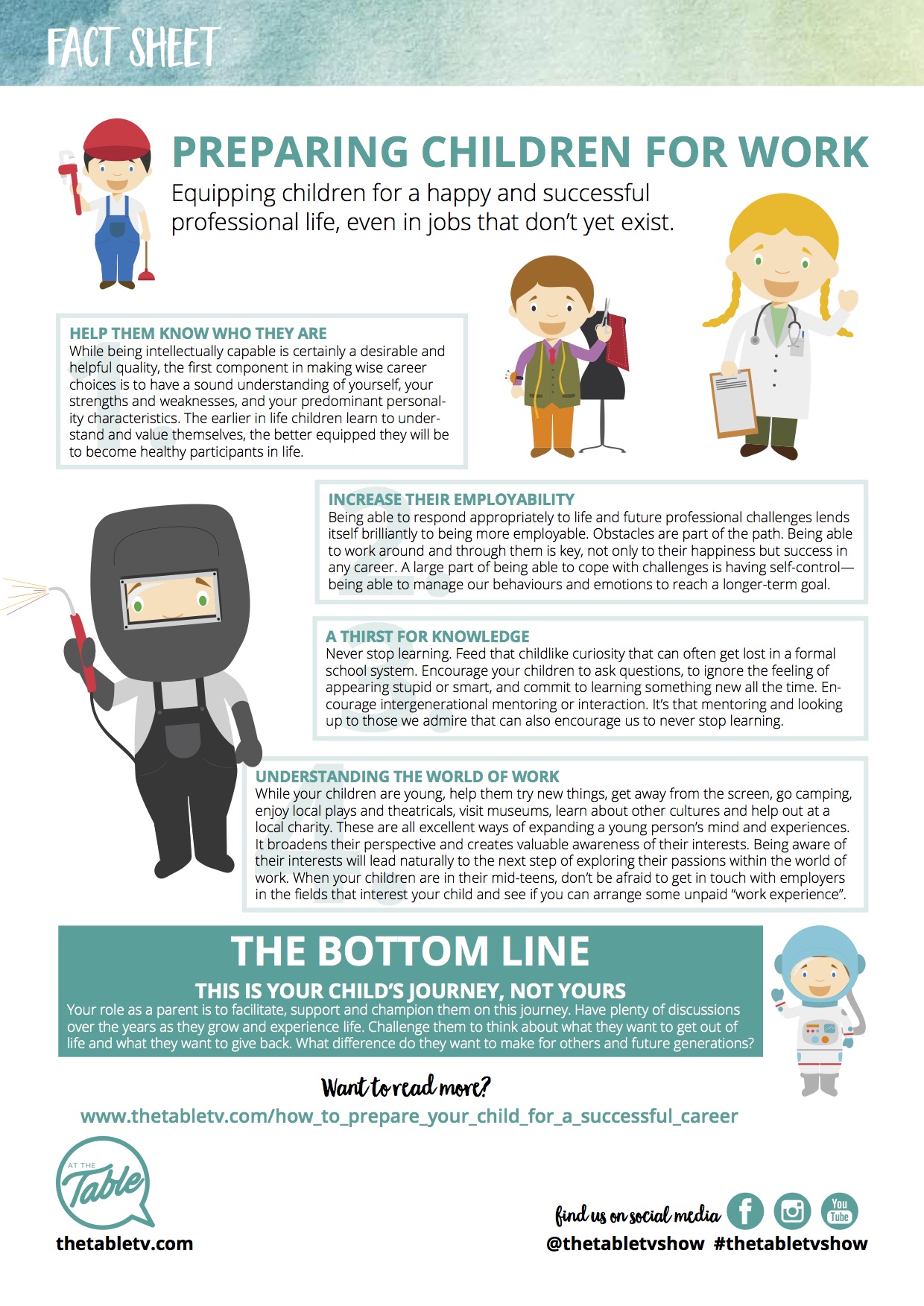Equipping children for a happy and successful professional life, even in jobs that don’t yet exist.
For young people, the world of work they are soon about to enter can feel a little uncertain—and with good reason. We are facing the birth of the fourth industrial revolution, which will and is bringing to the fore things previously present only in sci-fi movies, namely artificial intelligence and the Internet of Things (IoT).
According to the World Economic Forum, “Increased automation could eliminate jobs in manufacturing, transport, retail, healthcare and administration. . . . Most children entering primary school today will work in occupations that don’t even exist yet.”
Setting your child up for a happy and successful professional life should take place long before they leave high school. Spending time and effort to increase your child’s chance of being one of those fortunate people who look forward to going to work each day is a very astute investment. After all, we spend roughly one-third of our lives at work. Many people have spent unnecessary hours (months and even years) and large amounts of money pursuing a career, only to find out it is the wrong path for them.
As a parent, you want your child’s vocational path to be as smooth as it can be. And there are a lot of things that you can start doing now that will lay a solid foundation for your child’s future employment journey, setting your child up for a fulfilling working life.
Help them know who they are
While being intellectually capable is certainly a desirable and helpful quality, the first component in making wise career choices is to have a sound understanding of yourself, your strengths and weaknesses, and your predominant personality characteristics.
Our self-image and self perception are primarily based on and impacted by the significant people around us. What you say and how you treat your children (in fact, any child!) impacts how they view themselves and the world.
Understanding and being comfortable with who you are gives you the confidence to take healthy risks, to bounce back from failure, to try new things, to keep learning and build resilience. That golden path we want for our kids will have obstacles and challenges. No life is without them. The earlier in life they learn to understand and value themselves, the better equipped they will be to become healthy participants in life.
For example, if you understand you are quite investigative and thrive on exploring the why and how questions, but find yourself in a role where you are required just to be accepting, you will most likely become a frustrated, unhappy person and employee. This can occur even though you may have the correct hard-earned qualifications, required skills and even a strong interest. However, if it doesn’t align with who you are, your daily motivation and drive will be a casualty.
Increase their employability
Being employable is so much more than having a high IQ! Being considered smart is no doubt an asset professionally, but research and experience tell us there is more to a successful career than academic success.
Being able to respond appropriately to life and future professional challenges is something we can teach and foster within our kids from a young age and lends itself brilliantly to being more employable. Obstacles are part of the path. Being able to work around and through them is key, not only to their happiness but success in any career.
A large part of being able to cope with challenges is having self-control. Self-
control is being able to manage our behaviours and emotions to reach a longer-term goal.
Karen Young from Hey Sigmund, a psychology news website, says some practical examples of self-control are “delaying gratification, controlling impulses, pushing through frustration, persevering with a challenge, waiting patiently for your turn and controlling emotional outbursts. . . . Most children seem to master self-control by the time they are 10 years old.”
One of my favourite studies from the ’60s has brought great laughter (and some concern) when I tried this experiment on my own children. I’m referring to America’s Stanford University “Marshmallow Study”, a comical but effective test of self-control conducted on a group of four-year-olds.
In the study, each child was told they could eat a single marshmallow immediately if they wanted, or if they delayed the instant pleasure and waited 15 minutes, they would be given two marshmallows. Now, bear in mind to a four-year-old, 15 minutes is forever. The kids who managed to succeed in enduring the 15 minutes distracted themselves by looking away, talking or singing to themselves, and using a variety of tactics to help the time pass without constantly focusing on what they couldn’t have. Others call this setting goals or a vision and maintaining a constant focus on it, but it all starts with self-control.
Another favourite study of mine is the Dunedin Study, a research project that has followed the lives of just over 1000 willing participants since their birth in 1972. For the past four decades, New Zealand researchers have studied just about everything with this group, including self-
control. Their self-control studies parallel that of the Marshmallow Study, but what really stood out for me was the take-home message: “Follow-up studies over the course of their lives revealed that the children who were able to avoid temptation were healthier, had greater success at school and then in their careers, and had stronger relationships.”
Try the Marshmallow Study with your kids at home and see how they go. Remember that self-control can be taught, as can other highly employable and valued traits such as responsi-
bility, integrity and humility.
A thirst for knowledge
After a week of karate classes, my young daughter said she already knew what to do and didn’t need to have any more classes. It may have been a cute response from a five-year-old but, as an adult, that same attitude will limit growth.
Never stop learning. Feed that childlike curiosity that can often get lost in a formal school system. Encourage your children to ask questions, to ignore the feeling of appearing stupid or smart, and commit to learning something new all the time. Encourage intergenerational mentoring or interaction. It can create and engender belonging, empowerment and generosity. It’s that mentoring and looking up to those we admire that can also encourage us to never stop learning. That desire to increase in knowledge is also a highly employable trait.
Understanding the world of work
The final component to helping your child lay a great foundation for a good career is to have a broad understanding of the world of work. It’s like an infant learning how to eat and experiencing how different foods taste and feel for the first time. We don’t know if we like certain foods or textures until we try them.
As your child gets older and enters secondary school education, it would be worthwhile discussing what employment options and realistic opportunities are out there. Most people actually have a fairly narrow understanding of the vast array of career options available. There is a huge amount of information online to explore possible career paths for your child, but it’s even better to talk to people in industries that may interest them.
While your children are young, help them try new things, get away from the screen, go camping, enjoy local plays and theatricals, visit museums, learn about other cultures and help out at a local charity. These are all excellent ways of expanding a young person’s mind and experiences. It broadens their perspective and creates valuable awareness of their interests.
Being aware of their interests will lead naturally to the next step of exploring their passions within the world of work. When your children are in their mid-teens, don’t be afraid to get in touch with employers in the fields that interest your child and see if you can arrange some unpaid “work experience”.
One note of caution: work experience requires specific insurance to cover work health and safety regulations in Australia and New Zealand. However, most schools that arrange work experience do have insurance coverage, so talk to them.
Remember, this is your child’s journey, not yours. They are their own person with their own set of talents, dreams and passions. Your role as a parent is to facilitate, support and champion them on this journey. Have plenty of discussions over the years as they grow and experience life. Challenge them to think about what they want to get out of life and what they want to give back. What difference do they want to make for others and future generations?
You can always talk to a career counsellor to seek further help for your kids. Loving a career is a major life box that you want your children to tick. Be patient though; getting it right generally takes some time. Each time they explore options, they learn more about themselves and how they fit into the world of work. Think of it like panning for gold. Each time the pan is shaken, the unnecessary stuff falls away, taking you one step closer to the sought after prize.
Want more?

Download our handy list “4 Tips to Prepare Children for Work”. (PDF | 101 kb)
How helpful was this article?
Click on a star to rate it!
0 / 5. 0
Be the first to rate this post!
Rachel Humphries
Related posts
Subscribe
Receive personalised articles from experts and wellness inspiration weekly!


